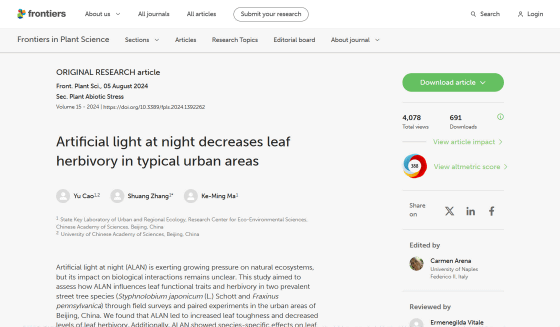Plants exposed to light at night will have hardened leaves that are less likely to be eaten by insects, which could lead to the collapse of the food chain.

The negative effects of human-made nighttime light, also known as
Frontiers | Artificial light at night decreases leaf herbivory in typical urban areas
https://www.frontiersin.org/journals/plant-science/articles/10.3389/fpls.2024.1392262/full

Streetlights running all night makes leaves so tough that insects can't eat them, threatening the food chain
https://phys.org/news/2024-08-streetlights-night-tough-insects-threatening.html
A research team led by Professor Shuang Zhang of the Center for Ecological and Environmental Sciences, Chinese Academy of Sciences, points out that 80% of the world's population lives in a world that is subject to light pollution on a daily basis, and that nighttime brightness has increased by 8% compared to natural environments. Increased artificial light at night can also affect plants, which could affect the insects that feed on them and the broader ecosystem.
'We noticed that tree leaves in most urban ecosystems generally show fewer signs of insect damage compared with those in natural ecosystems, and we wanted to know why,' said Zhang. 'Insect-free leaves may provide peace of mind for people, but not for insects. Grazing is a natural ecological process that maintains insect biodiversity.'
The research team hypothesized that plants exposed to more artificial light would focus more on defense than growth, resulting in stronger leaves with more defensive compounds.

The research team chose two types of plants
The study involved measuring the light intensity of 30 sampling sites, spaced approximately 100 meters apart along a highway where light was present all night, and collecting approximately 5,500 leaves in total to assess the extent to which leaves were eaten by insects, as well as their size, intensity, moisture content, nutrient levels, and levels of defense compounds, all of which may be affected by artificial light.
According to the team, larger leaves indicate that plants allocate resources to growth, while higher levels of strength and defensive compounds such as tannins indicate that resources are allocated to defense, while higher levels of water and nutrients suggest that plants are an attractive source of food for plant-eating insects.
The study found that for both ash and Chinese pagoda trees, the more artificial light they received at night, the harder their leaves became, and the less prone they were to insect damage. It also showed that when looking at the allocation of resources between growth and defense, ash, which is less susceptible to insect infestation, allocated more resources to growth, while Chinese pagoda trees, which are more susceptible to insect infestation, used more resources to defense.
'The underlying mechanism for this pattern remains unclear. It's possible that trees exposed to artificial light at night may prolong the time of photosynthesis. Moreover, these leaves may allocate more resources to structural compounds such as fibre, leading to increased leaf strength,' said Zhang.

'Reduced herbivory can trigger ecological trophic cascade effects,' Zhang said. 'Reduced herbivory can mean fewer herbivorous insects, which in turn can lead to fewer carnivorous insects and insectivorous birds. Insect declines are a global pattern that has been observed over recent decades, and we should pay more attention to this trend.'
'The study was conducted on just two trees in the city of Beijing, so caution is advised in generalizing the findings to a broader audience. Research on how urbanization affects insects and related ecological processes is still in its infancy,' said Zhang.
Related Posts:







